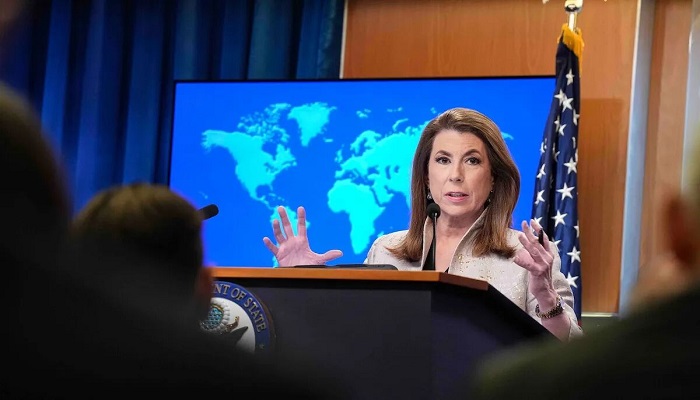PNN – Following a new round of US sanctions against Tehran’s drone program, the US State Department spokesperson claimed: We will use all means to disrupt Iran’s drone and missile programs.
According to the report of Pakistan News Network, US State Department spokesperson Tammy Bruce claimed on Tuesday local time: The United States will use all available tools to expose and disrupt Iran’s missile and drone development and weapons proliferation programs that destabilize the Middle East and beyond.
A US State Department spokesperson claimed: We will continue to take action against the sophisticated networks that Iran uses in third countries to conceal its purchases and transfers of sensitive technology.
The US State Department spokesperson continued his claims by adding: Iran uses this technology and the revenue from arms sales to bolster its military industrial base to manufacture missiles and drones that are used against other countries and also exported to Russia, proxy groups across the Middle East, and other actors.
The US Treasury Department claimed that the network also facilitated the supply of parts to other entities in Iran’s military-industrial complex, including the Iranian Aerospace Industries Company (HESA) and the Shahid Bakeri Industrial Group (SBIG).
The US Treasury Department stated: Today’s action is the second round of sanctions against Iranian weapons developers since the President’s February 4, 2025, memorandum to apply maximum pressure on Iran.
US Treasury Secretary Scott Besant claimed in a speech that Iran’s proliferation of drones and missiles, used by both its “terrorist proxies” in the region and Russia in its war against Ukraine, “continues to threaten American civilians, personnel, and our allies and partners.”
The Emirati company Infracom, which the US claims “participated in supplying engines to the Iranian company “Ra’h Roshd” and establishing contact with the engine manufacturer in China,” has been placed on the Treasury Department’s sanctions list.
Read more:
Pro-Palestinian researcher: America is dragging the world into a wider war in West Asia
Also, the Chinese company Zibo Shenbo Machinelectronics Co. Ltd, which, as an engine manufacturer, introduced “Rah Roshd” as its sales representative in Iran and, according to Washington’s claim, “supplied tens of thousands of engines to Shahid Bagheri Industrial Group,” was also subject to US sanctions.
Despite signing a memorandum imposing a maximum pressure policy on Tehran, the US President announced in an interview with the country’s Fox Business news network on March 7, 2025, that he had sent a letter to the Supreme Leader of Iran and requested negotiations.
Trump announced that the addressee of this letter was the Leader of the Islamic Republic of Iran and its subject was to express Washington’s willingness to negotiate with Iran and reach an agreement different from the JCPOA.
Anwar Gargash, Diplomatic Advisor to the President of the United Arab Emirates, arrived in Tehran at the head of an official delegation and met with Foreign Minister Seyyed Abbas Araqchi. During the meeting, Gargash handed over to the Iranian Foreign Minister the text of a letter sent by US President Donald Trump to the Supreme Leader.
Seyyed Abbas Araqchi, Foreign Minister of the Islamic Republic of Iran, said about the timing of Tehran’s response to the letter sent by US President Donald Trump: Iran’s official response to Trump’s letter was sent appropriately and through the country of Oman.
Araqchi clarified: This official response includes a letter in which our points of view regarding the current situation and Trump’s letter are fully explained and conveyed to the other party.
The Axios website, citing an informed source, wrote: The Sultanate of Oman has informed Washington that it has received Iran’s response to Trump’s letter.
The American media outlet, citing this informed source, added: The Omanis have informed the United States of the messages they received from the Iranians and will deliver Iran’s letter to the White House in the coming days.
Oman has played a key role in mediating between the United States and Iran during the Obama and Biden administrations.
According to Axios, several rounds of indirect talks between Biden advisers and Iranian officials have been held in Oman. The talks have focused mainly on regional issues and “hostages” but have not led to serious negotiations on the nuclear program.
This is while, according to the US Treasury Department, four rounds of sanctions against Iranian oil sales have been imposed since the issuance of the Presidential National Security Memorandum on February 4, 2025, in order to exert maximum pressure on Tehran.

